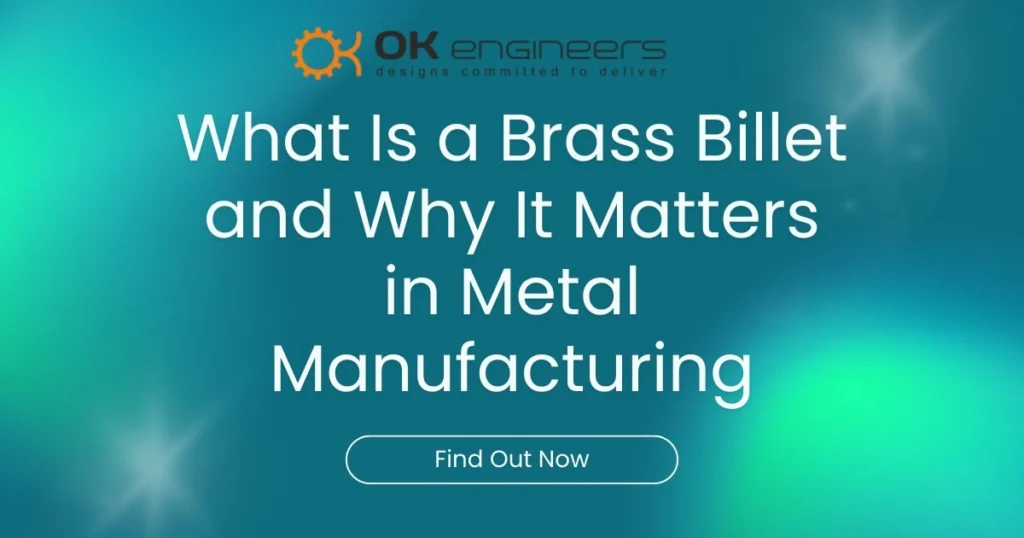Table of Contents
- What Is a Brass Billet?
- Brass Billet Manufacturing Process
- Latest Brass Billet Price Trends (2025)
- Precision Brass Components Manufacturer: Why Billet Quality Matters
- Applications and Benefits of Brass Billets
- OK Engineers: Raising Industry Standards
- Market Update: Trends, Automation, and Industry Insights (2025)
- Frequently Asked Questions (FAQs)
What Is a Brass Billet?
A brass billet is a solid, semi-finished metal product—typically cylindrical or rectangular—created by casting molten brass (an alloy of copper and zinc) into molds or via advanced casting methods. Professional firms such as OK Engineers, a recognized Precision Brass Components Manufacturer, often rely on high-quality billets as the base material for machining, forging, and producing finished industrial and electrical parts. Brass billets are cut into standard sizes and later processed into rods, bars, wire, sheets, and custom precision components, ensuring every batch meets stringent customer requirements.
- Brass billets serve as foundational inputs for manufacturing downstream brass parts.
- Supplier reputation, such as that of OK Engineers, is crucial to ensure billet quality, dimensional accuracy, and minimal wastage for all buyers.
- Their uniformity directly determines the machining and performance properties of the finished product.
Brass Billet Manufacturing Process
Leading manufacturers like OK Engineers follow advanced billet manufacturing and testing processes:
Process Overview
- Material Selection: High-purity copper and zinc, sometimes with special alloys, are sourced for consistent results.
- Melting: The batch melts in induction furnaces, typically at 950°C–1100°C, with protective agents to reduce oxidation.
- Casting: Molten alloy flows into pre-heated molds or passes through continuous casting lines for optimal grain structure and surface finish favored by Precision Brass Components Manufacturer standards.
- Cutting & Marking: Automated machines cut billets to exact length before passing rigorous checks.
- Quality Testing: Dimensional, chemical, and surface inspections—often automated—ensure billets meet project specs for companies like OK Engineers and other modern Precision Brass Components Manufacturer operations.
Forging & Extrusion
Certified billets can be directly hot-forged or extruded, boosting strength, dimensional control, and machinability for industries relying on suppliers such as OK Engineers.
You May Also Like This: How to Choose the Best Brass Alloy for Different Applications, Premium Brass Sanitary Fittings at Competitive Prices
Latest Brass Billet Price Trends (2025)
Brass billet prices in 2025 are influenced by raw copper price trends, regional supply dynamics, and global economic shifts:
- Brass billets: ₹420–480 per kg (India), $2.50–2.85 per pound (US) as of June 2025.
- Market operating averages were just under 50% this year due to caution across sectors.
- Strong brands such as OK Engineers have seen stable output, adapting inventory and pricing for evolving markets.
Key Price Influencers:
- Copper costs, international tariffs, and construction activity.
- Customers of leading Precision Brass Components Manufacturers, like automotive and electronics giants, track these data points closely for their sourcing.
Precision Brass Components Manufacturer: Why Billet Quality Matters
A trusted Precision Brass Components Manufacturer, such as OK Engineers, depends deeply on uniform, defect-free billets to manufacture parts meeting tight tolerances, especially for the electrical and automotive sectors:
- High-quality billets translate to easier machining, higher strength, and better surface results.
- Suppliers like OK Engineers use calibrated, ISO 9001:2015 certified controls throughout the billet-to-component workflow.
- Gujarat remains a worldwide hub for Precision Brass Components Manufacturer activity, exporting to North America, EU, and the Gulf.
Applications and Benefits of Brass Billets
Precision Brass Components Manufacturers use billets for products demanded by high-tech, plumbing, and utility sectors:
- Precision-made electrical contacts, terminals, pins, fittings, and valves.
- Parts made for telecom, marine, power distribution, and advanced industrial applications.
- Billets offer advantages such as corrosion resistance, machinability, and compatibility with automated CNC manufacturing.
OK Engineers: Raising Industry Standards
Founded in 1975 in Jamnagar, OK Engineers stands out as a major Precision Brass Components Manufacturer in India. The company holds ISO 9001:2015, ISO 14001:2015, and RoHS certifications, supplying electrical fittings, brass connectors, hydraulic parts, and custom components worldwide:
- Their precision billet-based components power leading global industries.
- Products are qualified for durability, tight tolerances, and strict safety standards.
- OK Engineers is focused on quality at every stage, from melt shop to final inspection, underpinning India’s “Make in India” initiative for industrial excellence and exports.
Market Update: Trends, Automation, and Industry Insights (2025)
- 2025 highlights major growth in automation, AI-enabled inspection, and digital tracking across manufacturers like OK Engineers.
- Global Precision Brass Components Manufacturer communities are boosting traceability, customer customization, and energy efficiency.
- Indian exporters are setting benchmarks for quality, supply reliability, and international regulatory compliance.
Frequently Asked Questions (FAQs)
Q1: What makes brass billets preferable in manufacturing?
Ans: Brass billets combine machinability, strength, and corrosion resistance, making them ideal for parts made by a Precision Brass Components Manufacturer like OK Engineers.
Q2: Are billet prices expected to rise further in 2025?
Ans: Current forecasts suggest stable rates, but changes in copper prices or tariffs could impact sourcing for companies such as OK Engineers and their clients.
Q3: How do buyers assure billet quality?
Ans: Choose verified suppliers like OK Engineers, recognized as a top-tier Precision Brass Components Manufacturer. Ask for documentation, third-party testing, and ISO certifications prior to procurement.
Q4: What’s the typical shelf life of a brass billet?
Ans: With correct storage, billets from high-quality suppliers such as OK Engineers can be used productively for years.



